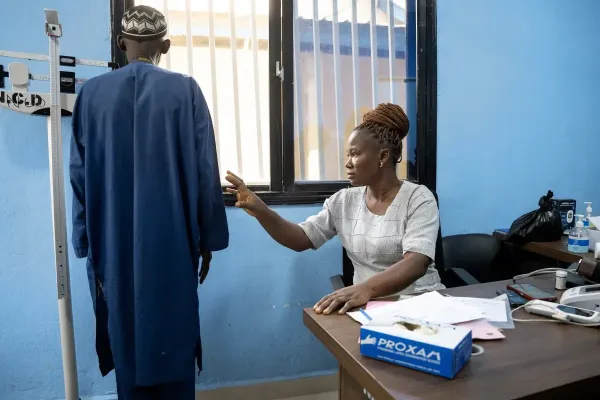On February 4, a small crowd gathered in front of the newly constructed non-communicable diseases (NCD) clinic at Koidu Government Hospital (KGH). Two small tents and several rows of white chairs were arranged to seat the speakers and attendees. The audience — a mix of hopeful community members, patients, and clinicians — had waited years for the clinic’s expansion, fueled by an increasing demand for care.
The crowd had assembled to celebrate a historic milestone for Sierra Leone: the launch of a dedicated NCD clinic for severe conditions under the PEN-Plus strategy. PEN-Plus is designed to improve access to care for patients living with serious NCDs at first-level hospitals in rural settings. NCDs are chronic illnesses that usually develop over a long period of time and are caused by a mix of genetic, biological, environmental, and lifestyle-related factors. PEN-Plus equips mid-level health care workers, such as nurses and health officers, with the specialized training to treat conditions including type 1 diabetes, rheumatic heart disease, and sickle cell disease.
A plaque on the clinic’s entrance proudly highlights the collaboration between the Ministry of Health (MOH), NCDI Poverty Network, and Partners In Health (PIH). At the ribbon-cutting event, patients spoke candidly about their journeys of diagnosis, long-term treatment, and renewed hope. Officials from MOH and other partners expressed pride in this achievement and reaffirmed that this clinic was just the beginning.
Not Just a Western Problem
Health systems in low-resource countries like Sierra Leone are grappling with a double burden of disease. While they continue to battle infectious diseases like HIV and tuberculosis (TB), access to NCD care remains severely limited. According to the World Health Organization (WHO), more than one-third of deaths in sub-Saharan Africa are caused by NCDs, with a worrying increase among people under the age of 70. In 2019, NCDs accounted for 34% of all deaths in Sierra Leone.
These conditions — which require lifelong care and consistent medication — place an immense financial burden on patients and families already navigating poverty and limited social safety nets. In many countries, NCD care is either inaccessible or unaffordable for rural and marginalized populations, leading to unnecessary disability and premature death.
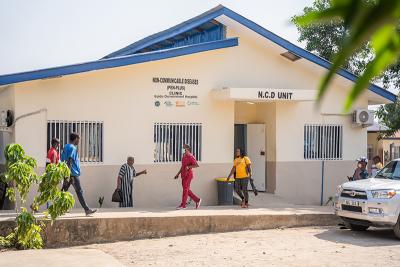
The NCD clinic expansion building officially opened on February 4, 2025.
Chiara Herold / PIH
“I want people to understand that NCDs are not just a Western problem. They are a growing issue in Sub-Saharan Africa. We’re seeing an increasing number of complex cases and disabilities mainly driven by limited access to care,” says Dr. Eleyias Tebeje, internal medicine doctor at KGH and the NCD PEN-Plus lead.
The Dignity of Privacy
KGH began offering NCD services in 2018, and quickly became a referral point for patients not only across Sierra Leone but also from neighboring Guinea and Liberia. Yet the demand soon outpaced available resources.
“The patient-to-clinician ratio was high, and the space was small. There was no privacy, making it impossible to deliver diagnoses confidentially,” recalls Tebeje.
The long wait times and the pressure on clinicians to see large volumes of patients led to treatment dropouts and high rates of loss to follow-up. This challenge was a stark reminder of how inadequate infrastructure can undermine even the best clinical efforts.
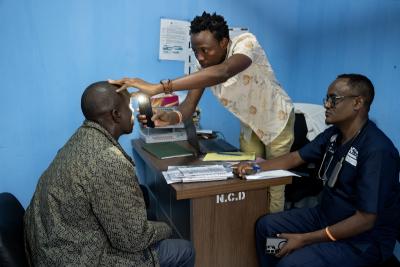
Community Health Officer Sylvanus Kondoh (center) examines Adikali Kamara, a patient with hypertension and type 2 diabetes, at the NCD clinic. Internal Medicine Consultant Dr. Eleyias Tebeje (right) mentors all community health officers on a regular basis by observing patient consultations.
Chiara Herold / PIH
That challenge gave rise to the vision for a larger, purpose-built NCD clinic.
Today, the new NCD clinic includes three consultation rooms, an observation room for stabilizing critically ill patients, a vital signs and screening room, and an ultrasound room. A new pharmacy nearby exclusively serves patients from the NCD clinic, reducing congestion and wait times elsewhere in the hospital. For community health officer Amadu Gbandeh, this new facility brings a sense of security.
“The presence of this structure shows the project’s commitment to sustainability,” remarks Gbandeh. “It assures us that the NCD clinic will be here for years to come.”
Modern Tools and Systems
Equipped with the tools to manage the most common NCD cases, the clinic offers testing for type 1 diabetes, sickle cell screening, and echocardiograms for patients with congenital and rheumatic heart disease. Moreover, the site has implemented an electronic medical record (EMR) system – a crucial step in improving continuity of care, quality control, and data-driven decision-making.
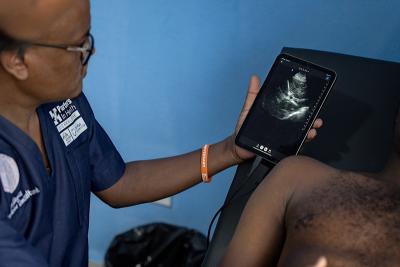
Dr. Eleyias Tebeje, internal medicine consultant, during a patient consultation in the NCD clinic on February 27, 2025.
Chiara Herold / PIH
Building Expertise
For many clinicians working in the NCD clinic, this facility holds a much deeper meaning. “I greatly understand what patients go through. When I began working at KGH in 2021, I was diagnosed with diabetes, and I spent a difficult year managing the condition,” shares Gbandeh. For patients with type 1 diabetes, the initial challenge of managing multiple daily injections can be overwhelming without proper guidance and support. Having providers with lived experience can be powerful in building trust.
The clinic is also a center of professional development. Through mentorship from the NCDI Poverty Network’s technical and research team, clinicians are strengthening their capacity in diagnostics and care delivery.
“I came to KGH straight from school with no experience, and all the training and knowledge I have came from the project,” says Gbandeh.
With regular, hands-on training, community health officers and nurses now perform basic scans and read and interpret X-rays, a crucial step in decentralized care. The team is actively expanding this model beyond the hospital by training clinical staff at primary health units (PHUs) across Kono District.
“We are training mid- and low-level clinicians at PHUs,” explains Abubakkar Samura, the PEN-Plus project specialist. “Our goal is to transform this site into a training hub for handling PEN-Plus conditions.”
Shaping Healthier Futures
One of the most effective ways to prevent NCDs is through education. Each morning, outside the NCD clinic, a nurse leads a 30-minute health talk for patients awaiting registration. Seated on benches, patients listen as the nurse uses bright visuals to explain the principles of a healthy diet and the risks of behaviors such as smoking, excessive alcohol use, and physical inactivity.
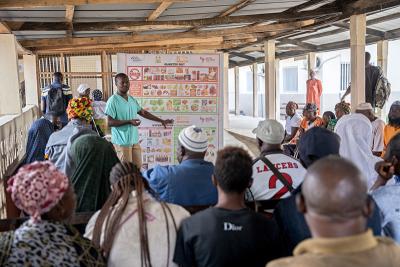
Nurse Abdulai Kallon leads a discussion about nutrition and healthy lifestyle choices for patients with hypertension. The NCD clinic hosts health talks on various topics every morning at 8 a.m. Photo by Chiara Herold / PIH
Chiara Herold / PIH
This space allows for open dialogue. Patients ask questions and raise concerns, and the nurse responds thoughtfully, ensuring everyone understands.
“For many of these patients, it’s the first time they’re learning about these conditions,” comments nurse Lilian Kumba Phillie. “So we emphasize the importance of regular check-ups and stress that while these conditions aren’t curable, management is possible.”
